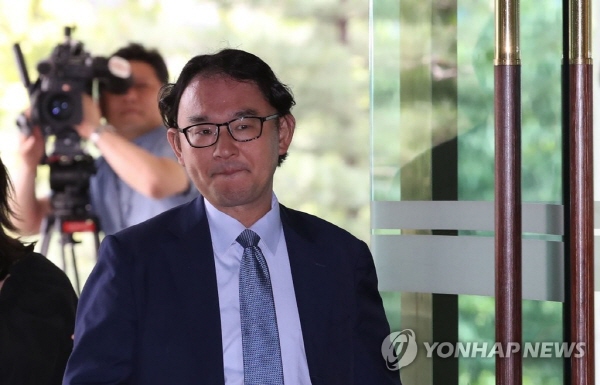South Korea called in a Japanese diplomat Monday to demand Tokyo's explanation on its reported plan to discharge into the Pacific Ocean contaminated water from the 2011 Fukushima nuclear plant meltdown.
The move came amid Seoul's push to reverse Tokyo's recent export curbs through bilateral dialogue and pressure. Seoul sees the curbs as political retaliation for last year's South Korean Supreme Court rulings against Japanese firms over wartime forced labor.
Kwon Se-jung, the director general in charge of climate change and environmental affairs at Seoul's foreign ministry, summoned Tomofumi Nishinaga, a minister for economic affairs from the Japanese Embassy in Seoul.
Kwon delivered to him a not

e verbale (a diplomatic document) to highlight Seoul's concerns on the radioactive water and request that Tokyo verify reports and claims on the discharge plan, and clarify its future disposal scheme.
"Our government very gravely recognizes the impact that the results of the disposal of contaminated water from the Fukushima plant may have on the health and safety of both countries' citizens, and by extension on the entirety of countries linked along the ocean," the ministry said in a press release, referring to the note verbale.
"The government also requested that the Japanese government more transparently and specifically explain to the international community-related measures, including how it will handle the Fukushima nuclear reactor," it added.
Kwon, in addition, proposed that Seoul and Tokyo jointly explore ways to prevent the disposal of the contaminated water from affecting the marine ecosystem in waters near the site.
Nishinaga said that he would relay Seoul's position to Tokyo and said that Japan will faithfully and transparently offer information related to its handling of the Fukushima plant water, the ministry said.
Tokyo is still reviewing how and when to dispose of the water in question, and that it has been making efforts to expand the capacity of its storage facilities, an official at the foreign ministry here said, citing remarks from Nishinaga.
Japan also noted that claims from civic groups do not represent its official position, the official said.
Japan has been exploring various options to dispose of the tritium-laced water, including evaporating it and putting it deep underground. But discharging the treated water into the ocean is seen as the cheapest and quickest -- thus tempting -- disposal method.
The Seoul official said that the preferred option for Korea is to store the water for a long period despite space limits.
He also said that information that Japan has so far provided about the contaminated water was not sufficient, a reason why Seoul wants to hold regular, close bilateral consultations over the issue.
The summons came as Seoul has been heaping pressure on Tokyo to retract its export restrictions, including this month's decision to strip Korea of preferential trade status while calling for a diplomatic solution to the trade tussle.
Last week, Seoul brought the contaminated water issue out into the open by vowing to "actively" deal with the issue as fears are growing that Tokyo could release it into the ocean as storage space at the nuclear plant is expected to run out around 2022.
After learning last August of Tokyo's alleged move to discharge the water, South Korea delivered to Japan in October a document detailing its concerns and related requests. It has since called for Tokyo to elucidate its handling of the issue during bilateral and multilateral forums.
The issue of the toxic water has posed a hurdle to Japan's preparations for the 2020 Tokyo Olympics.
Environmental groups and activists, such as Greenpeace, have opposed the discharge of the water. In a January report, Greenpeace said that a Japanese government task force proposed the discharge plan and ignored alternative options that would avoid further contamination of the ocean. (Yonhap)

